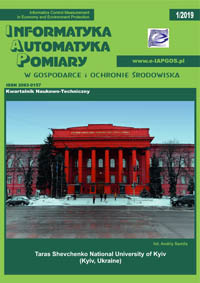STEGANOGRAPHY – THEORY AND PRACTICE
Article Sidebar
Issue Vol. 9 No. 1 (2019)
-
EMG FIELD ANALYSIS IN DYNAMIC MICROSCOPIC/NANOSCOPIC MODELS OF MATTER
Pavel Fiala, Karel Bartušek, Jarmila Dědková, Premysl Dohnal4-10
-
SLUG FLOW VELOCITY ESTIMATION DURING PNEUMATIC CONVEYING OF BULK SOLID MATERIALS BASED ON IMAGE PROCESSING TECHNIQUES
Mateusz Miłak, Agnieszka Leszczyńska, Krzysztof Grudzień, Andrzej Romanowski, Dominik Sankowski11-14
-
REVIEW OF MOBILE BANKING SOLUTIONS INCLUDING THE ANALYSIS OF SURVEY PERFORMED AMONG THE INDIVIDUAL USERS
Jolanta Panas, Katarzyna Wilczyńska15-22
-
THE REVIEW OF SELECTED ELECTRICAL ENERGY STORAGE TECHNIQUES
Aleksander Chudy23-28
-
OPTIMIZATION OF CONTROLLED EXPLOSION PROCESSES PARAMETERS USING COMPLEX ANALYSIS METHODS
Andrii Ya. Bomba, Andrii P. Safonyk, Kateryna M. Malash29-32
-
APPLIED QUASIPOTENTIAL METHOD FOR SOLVING THE COEFFICIENT PROBLEMS OF PARAMETER IDENTIFICATION OF ANISOTROPIC MEDIA
Andrii Bomba, Andrii Safonyk, Olha Michuta, Mykhailo Boichura33-36
-
MATHEMATICAL MODELING SINGULARLY PERTURBED PROCESSES OF WATER SOFTENING ON SODIUM-CATIONITE FILTERS
Andrii Safonyk, Ihor Prysiazhniuk, Olena Prysiazhniuk, Oleksandr Naumchuk37-40
-
ALGORITHM OF USER’S PERSONAL DATA PROTECTION AGAINST DATA LEAKS IN WINDOWS 10 OS
Olexander Zadreyko, Olena Trofymenko, Nataliia Loginova41-44
-
STEGANOGRAPHY – THEORY AND PRACTICE
Vladimir Barannik, Bogdan Gorodetsky, Natalia Barannik45-48
-
ELEMENTS EVALUATION OF SOFT-HARDWARE OBJECTS WITH COMPLEX PHYSICAL, INFORMATION STRUCTURES LINKS
Pavel Khusainov49-52
-
ANALYSIS AND CHOICE OF ROUTING PROTOCOLS IN WIRELESS AD HOC NETWORKS BASED ON THE USE THE NEURAL NETWORK
Oleksandr Oksiiuk, Vadym Krotov53-56
-
INCREASING THE SPECIFIC RATE OF CONTINUOUS PHASE MODULATION SIGNALS
Victor Banket, Sergei Manakov57-60
-
OPTICAL SENSOR OF FLAVONOIDS BASED ON LIQUID CRYSTAL
Orest Sushynskyi, Romana Petrina, Zoriana Gubriy, Semen Khomyak, Zinoviy Mykytyuk , Volodymyr Novikov61-64
Archives
-
Vol. 11 No. 4
2021-12-20 15
-
Vol. 11 No. 3
2021-09-30 10
-
Vol. 11 No. 2
2021-06-30 11
-
Vol. 11 No. 1
2021-03-31 14
-
Vol. 10 No. 4
2020-12-20 16
-
Vol. 10 No. 3
2020-09-30 22
-
Vol. 10 No. 2
2020-06-30 16
-
Vol. 10 No. 1
2020-03-30 19
-
Vol. 9 No. 4
2019-12-16 20
-
Vol. 9 No. 3
2019-09-26 20
-
Vol. 9 No. 2
2019-06-21 16
-
Vol. 9 No. 1
2019-03-03 13
-
Vol. 8 No. 4
2018-12-16 16
-
Vol. 8 No. 3
2018-09-25 16
-
Vol. 8 No. 2
2018-05-30 18
-
Vol. 8 No. 1
2018-02-28 18
-
Vol. 7 No. 4
2017-12-21 23
-
Vol. 7 No. 3
2017-09-30 24
-
Vol. 7 No. 2
2017-06-30 27
-
Vol. 7 No. 1
2017-03-03 33
Main Article Content
DOI
Authors
Abstract
Analysis of modern interstate conflicts, trends in the development of forms of warfare. It is shown that confrontation is characterized by various forms, is hidden in nature and is carried out mainly in the political, economic, informational and other spheres. It is proved that a significant part of hybrid wars are information operations used for the destructive impact on society, commercial activities, politics and economics using information and communication space and technologies. The article expresses the need to create a theoretical basis for combating cyber attacks in special telecommunication systems as an integral part of the national security of the state. The development of methods for hiding information as well as providing information during video streaming and images in networks is underway. The basic calculations are given at the initial stages of information hiding and methods for ensuring the latent transfer of data in telecommunication systems.
Keywords:
References
Ablamejko S., Lagunovskij D.: Obrabotka izobrazhenij: tehnologija, metody, primenenie. Amalfeja, Minsk 2000.
Barannik V. V., Alimpiev A. M., Bekirov A., Barannik D. V., Barannik N. D.: Detections of sustainable areas for steganographic embedding. Proc. East-West Design & Test Symposium (EWDTS) 2017, 555–558 [DOI: 10.1109/EWDTS.2017.8110028].
Barannik V., Barannik D., Bekirov A., Lekakh A.: Steganographic method based on the modification of regions of the image with different saturation. Proc of. 14th International Conference: Advanced Trends in Radioelecrtronics, Telecommunications and Computer Engineering 2018, 542–545 [DOI: 10.1109/TCSET.2018.8336260].
Christophe E., Lager D., Mailhes C.: Quality criteria benchmark for hiperspectral imagery. IEEE Transactions on Geoscience and Remote Sensing 43(9)/2005, 2103–2114.
Computer viruses, Moscow, 2011.
Gonzalez R., Woods R.: Tsyfrova obrobka zobrazhen. Tekhnosfera, Kiev 2018.
Gribunin V., Okov I., Turincev I.: Tsifrovaya steganografiya. Solon-Press, Moscow 2018.
Grundmann M., Kwatra V., Han M., Essa I.: Efficient hierarchical graph based video segmentation. IEEE CVPR, 2010.
Konakhovich G. M, Puzyrenko A.: Computernaya steganographiya. Teoriya i praktika. To Press, Kiev 2016.
Melnik A. M.: Informatsiyni systemy ta merezhi. Bulletin “Lviv Polytechnic” 673, 2010, 365–374.
Miano J.: Compressed image file formats: JPEG, PNG, GIF, XBM, BMP. Addison-Wesley Professional, New York 1999.
Miano J.: Formats and image compression algorithms in action. Triumph, Kiev 2013.
Pratt W., Chen W., Welch L.: Slant transform image coding. Proc. Computer Processing in Communications. Polytechnic Press, New York 1969.
Savyn L.V. Setetsentrychnaya y setevaya voyna. Vvedenye v kontseptsyyu. Evrazyyskoe dvyzhenye, Moscov 2011.
Sindeev M., Konushin A., Rother C.: Alpha-flow for video matting. Technical Report, 2012.
Stankiewicz O., Wegner K., Karwowski D., Stankowski J., Klimaszewski K., Grajek T.: Encoding mode selection in HEVC with the use of noise reduction. Proc. International Conference on Systems, Signals and Image Processing (IWSSIP), Poznan, 2017, 1–6.
Wallace G.: Overview of the JPEG (ISO/CCITT) – Still image compression: image processing algorithms and techniques. Processing of the SPIE 1244, 1990, 220–233.
Wallace G.: The JPEG Still Picture Compression Standard. Communication in ACM 34(4)/1991, 31–34.
Wang S., Zhang X., Liu X., Zhang J., Ma S., Gao W.: Utility-Driven Adaptive Preprocessing for Screen Content Video Compression. IEEE Transactions on Multimedia 19(3)/2017, 660–667.
Article Details
Abstract views: 406
License

This work is licensed under a Creative Commons Attribution-ShareAlike 4.0 International License.






